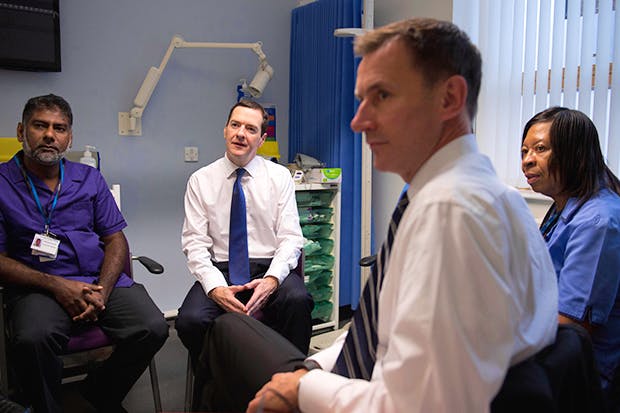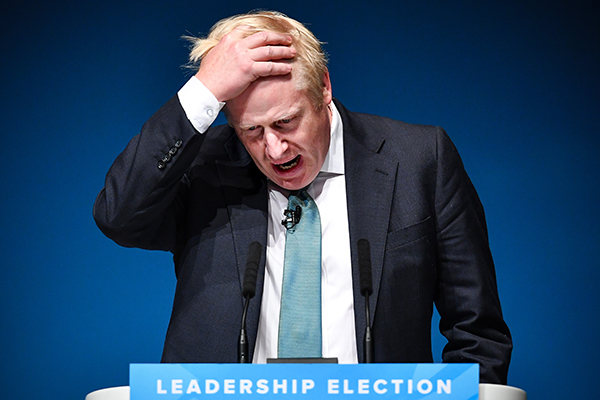Listen
http://rss.acast.com/viewfrom22/thegreatfakewar/media.mp3
The Autumn Statement on 25 November had long been circled in Downing Street diaries as the season’s defining political moment. Its importance only grew after the Lords rejected the government’s tax-credit changes and George Osborne announced that he would present his revised proposals in this statement. But now it is not even seen as the defining political moment of this week, pushed down the news agenda by the terrorist threat in Europe and David Cameron’s decision to make the case to the Commons for Britain extending its anti-Islamic State bombing into Syria.
The extent of the security threat to Europe is becoming all too apparent. Not only have we seen more than 100 people gunned down in the French capital, we have seen another European capital essentially shut down by terrorists for several days. For obvious reasons, the question of how to deal with this threat is now what dominates politics.
The Tories have tried to make ‘security’ their watchword since before the general election. But the focus has now shifted from economic security to national security. This shift was under way even before Paris.
Jeremy Corbyn’s election as Labour leader, with his hard-leftist views on foreign policy and dovish position on terrorism, created a particular political opportunity. While his left-wing populism on the economy has some appeal, the electoral market for abolishing the army and calling Osama bin Laden’s death a tragedy is almost non-existent. Last month, one of the most political people in Downing Street summed up the Tory approach to Corbyn and Labour thus: ‘National security, that’s how we’ll disqualify them. We don’t even need to get to the economics.’
Corbyn’s problems with his own MPs have got so much worse because events have propelled national security to the top of the political agenda. Labour MPs know that his positions on these issues are electorally disastrous. In the Oldham by-election, Ukip aren’t savaging Labour for Corbyn’s views on the economy but for his argument that Mohammed Emwazi (‘Jihadi John’) shouldn’t have been taken out by a drone strike. This is proving so effective that Labour will now be relieved just to hold on to a seat that it won with a majority of more than 14,000 in May.
Yet the economy is still the key to the Tory effort to create a new coalition of voters that can keep them in power for a decade or more, and to Osborne’s own political prospects. That is why this Autumn Statement was still so important, politically.
At their autumn conference, the Tories tried to present themselves as the new workers’ party. Cameron talked about his commitment to social reform, to equality of opportunity, and promised an ‘all-out assault on poverty’. Yet the Tories have to achieve these things while cutting back the state.
Osborne’s decision to junk entirely the tax credit changes announced in the summer Budget shows just how hard it can be to combine these two objective. But those close to Osborne argue that this is possible, that even after this spending review the government is still spending several trillion pounds. They point out that even with the cuts announced on Wednesday, Osborne could still put another£7 billion into housing. The decision to spend more on house-building and the willingness to look again at planning rules is a reminder of how much this issue exercises Osborne. He believes falling levels of home ownership and spiralling house prices are one of the biggest obstacles to creating a new-centre-right majority in Britain. He is far less concerned than Cameron about the effect that major house-building will have on the landscape.
Another area where Osborne is determined to keep putting in extra resources is the health service. He believes it was Cameron’s NHS commitment that was the most important and electorally significant element of Tory modernisation. The tensions between 10 and 11 Downing Street and Jeremy Hunt in recent weeks have been borne out of frustration that, despite the cash that the Tories are pumping in, they are still regularly waking up to headlines about the NHS being in crisis.
This spending review was made harder by the fact that most of the obvious cuts were made last time round. But it was made easier by the absence of Liberal Democrats: Nick Clegg had no veto. Some ministers have also remained enthusiasts for reducing spending even though they now run departments. I understand that both the Business Secretary, Sajid Javid, and the Environment Secretary, Liz Truss, had some of their proposed cuts knocked back by the Treasury. Indeed, the extent to which Osborne has tried to protect elements of the government’s ‘industrial strategy’ from sweeping cuts to the Department for Business shows how much he has changed in office. His politics now owe more to Michael Heseltine than Nigel Lawson.
The spending review, as with everything in Tory politics these days, has become tangled up with the succession question. Some ministers grumble that those departments run by the Chancellor’s allies have had an easier time reaching agreement with the Treasury than others. But it would be more accurate to say that the Treasury has tended to reward those departments that have played the game; that put their cuts submission in on time and so on.
Osborne hasn’t, though, been above using a bit of peer pressure to push ministers into striking a deal. When the Public Expenditure Committee, also known as the Star Chamber, met last week, those secretaries of state whose departments had settled were allowed into the room first, while those who hadn’t were kept waiting outside. But those ministers who haggled with the Treasury until the last possible moment are unapologetic about having done so. One said of those ministers who did make a quick deal: ‘Let’s see if they still nodding in January.’
In the last parliament, Osborne slowed his deficit reduction plan and paid no political price because Labour wasn’t fiscally credible. Today’s Labour party, though, makes Ed Miliband and Ed Balls look like deficit hawks. For that reason, Osborne wouldn’t have paid a high political price if had reduced the 10 billion surplus he said he would deliver by the end of the parliament. But if there were not to be a surplus after ten years of a Tory in the Treasury, it would have shown that the Conservatives weren’t fiscal conservatives any more. His decision to stick with the £10 billion surplus is an attempt to reassert his and his party’s fiscal credentials.
Got something to add? Join the discussion and comment below.
Get 10 issues for just $10
Subscribe to The Spectator Australia today for the next 10 magazine issues, plus full online access, for just $10.















Comments
Don't miss out
Join the conversation with other Spectator Australia readers. Subscribe to leave a comment.
SUBSCRIBEAlready a subscriber? Log in